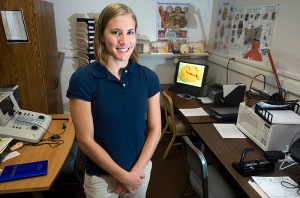
Jennifer Paulovicks McCullagh earned her Ph.D. in communication sciences (audiology) in May, a month after she won two highly competitive national research awards for her work on how the auditory areas in the brain respond to noise.
Now she is working to complete her second doctoral degree at UConn, the Au.D., or doctor of audiology, a four-year clinical degree recently established at UConn.
McCullagh worked toward both graduate degrees simultaneously after earning her bachelor’s degree in 2003 in communication disorders from the College of Liberal Arts and Sciences.
“I came to UConn thinking I was going to be a political science major,” she says.
But undergraduate research projects with two faculty members in communications disorders – Frank Musiek and Kathleen Cienkowski – changed her plans. Overall, she has worked on five research projects in the Neuroaudiology Lab in CLAS and written three professional papers (two still in preparation, one published).
“That’s a lot of experience – the opportunities have been phenomenal,” she says.
Her research has been in central auditory processing disorders and auditory electrophysiology – studying how the brain processes auditory information.
She has also studied how the auditory systems of people with longstanding hearing losses respond or change when people are fitted with hearing aids.
In April she won a National Institutes of Health – American Auditory Society research award for research into hearing and noise – how neurons in the brain’s auditory cortex respond when noise is present. She was also one of five graduate students in the nation to receive an American Academy of Audiology Student Research Award.
After she finishes her second doctoral degree, she is planning to work as an audiologist for the Veterans Administration in West Haven, where she wants to study the hearing losses reported by young veterans returning from war with traumatic brain injuries. While they can pass conventional hearing tests, they have significant auditory complaints related to central auditory processing abilities, such as hearing in noisy situations.


